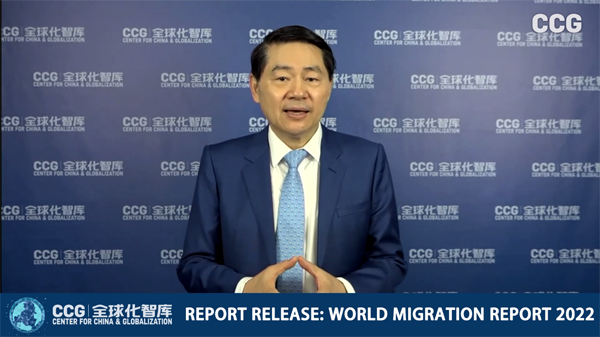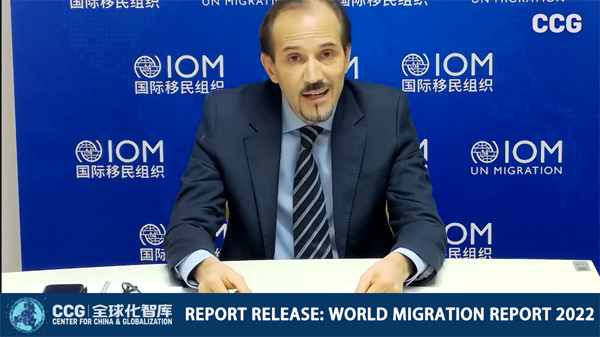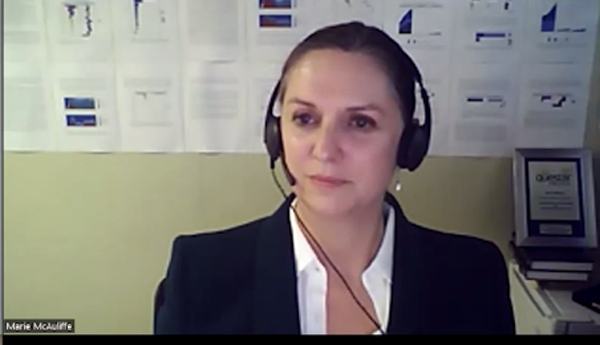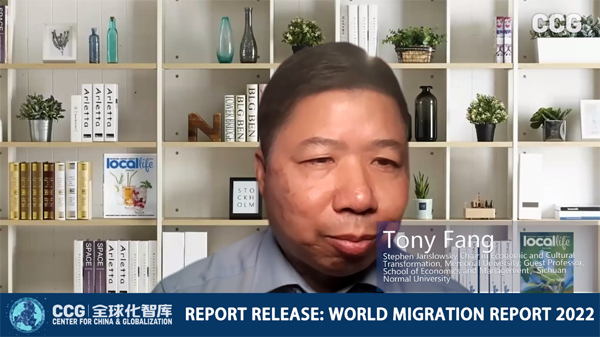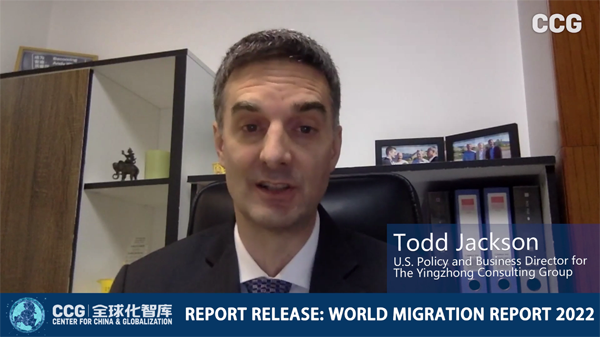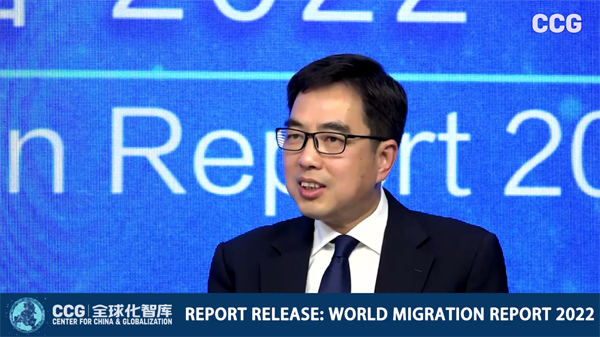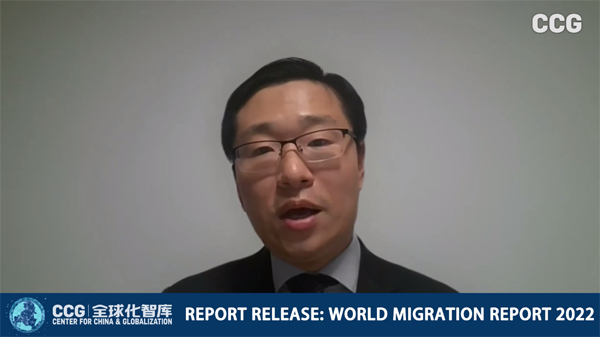CCG holds seminar on current challenges to migration around the world
November 02 , 2022
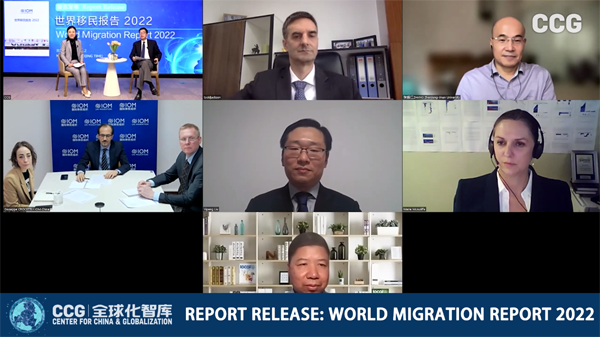
WANG Huiyao, President of CCG stated that globalization has made states more connected than ever, but the COVID-19 pandemic has hindered the progress of globalization and migration. He emphasized the importance CCG has attached to translating and publishing the World Migration Report, which reviews the changing face of world migration and key issues raising from migration. The World Migration Report 2022 provides a brand-new perspective on the pandemic and covers topics including countering human trafficking and climate change, which are linked to trends in world migration.
Giuseppe Crocetti, Chief of Mission at IOM China, said that more and more information on migration has become available to us globally. In the context of a globalized world, no country can manage migration alone and cooperation is needed to better manage world migration. The World Migration Report contributes to strengthening global development, peace and security, and it is significant in a world confronted with crises in areas of health, climate and economy. He also spoke highly of CCG’s contributions in translating and compiling this report.
Marie Mcauliffe, Head of Migration Research Division and Editor of the World Migration Report., based at IOM Headquarters in Geneva, emphasized that IOM is committed to the principle that humane and orderly migration benefits migrants and society. She pointed out that IOM has published multiple world migration reports since 2000, which have been translated into 10 languages. The World Migration Report 2022 particularly focuses on the impacts of COVID-19 and climate change on world migration. By offering detailed data, this report analyses the impact of artificial intelligence and human trafficking in migration. She also emphasized the significant contribution of CCG in translating this report into Chinese.
Tony Fang, Stephen Jarislowsky Chair in Economic and Cultural Transformation at Memorial University and Guest Professor at the School of Economics and Management of Sichuan Normal University used the example of Canada, which is a multicultural country with a large number of immigrants, highlighting three areas in which Canada could better manage immigration. First, digital innovation should leverage digital technologies to streamline processes, drive research and practice, and enhance the potential for collaboration with other settlement and other immigration system stakeholders. Moreover, social innovation should be used to enhance cross-sector communication and collaboration, and in addition to traditional metrics of success, create a sense of belonging among newcomers. Finally, managerial innovation should emphasize core competencies and seeking creative ways to generate revenue to support the long-term mission of the sector.
Todd Jackson, US Policy and Business Director for The Yingzhong Consulting Group said that for the US, immigration policy will not change significantly and will be a major topic in the 2024 presidential election. He pointed out that there are still large number of illegal immigrants entering the US across the southern border and many border states do not have the resources to handle the influx. As a consequence, these immigrants are beginning to move to non-border areas. This number has grown significantly for several years, and the US government is under political pressure to address this issue, which will require further attention in the future.
Mike Liu, Vice President at the China Global Talent Society noted that the IOM has played a significant role in addressing the challenges resulting from the Russia and Ukraine conflict as well as climate change. Recent observations show that there is still room for China to improve its talent cultivation policies, which should encourage talent to move freely and legally from one country to another. He also noted that the international community should come up with solutions to mitigate the Russia-Ukraine conflict and emphasized the importance of technology in addressing issues in migration.
Yipeng Liu, Founding Dean of the Yellow River College of Business, Professor and Director of the Center for China Management and Global Business at University of Reading and a non-resident senior fellow at CCG, said that migrant talent can make huge contributions to addressing global challenges. He used the example of climate change, which has become a pressing global issue for both developed and developing countries. On this issue. global talent mobility plays a vital role in working toward sustainable human development. In order to better balance and utilize human resources, we should consider non-regional industrial structures to create a balance between entrepreneurial talent and regional development.
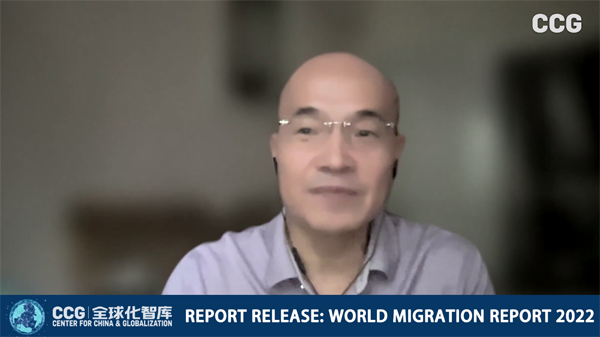
Zhenjiang Zhang, Professor & Dean and the School of International Studies/Academy of Overseas Chinese Studies of Jinan University in Guangzhou, praised CCG’s contribution in translating the World Migration Report. In the past three years, restrictions have been placed on mobility due to the pandemic and this report offers a deep analysis of trends in migration. He believes that transnational migration is still very vulnerable due to diseases, natural disasters and other factors, and it is important for governments to encourage international migration. With China’s rising importance on the issue of migration, it is necessary to participate in the research in related areas. He also believes that China’s rules on international migration will be more influential in the future.
The World Migration Report is the flagship publication of the International Organization for Migration (IOM). Aimed at providing an authoritative account of migration trends and issues worldwide, this report deepens the understanding of migration by policy makers, researchers and the general public.
The World Migration Report 2022 focuses on developments in migration over the last two years and is comprised of two parts. Part I introduces “key data and information on migration and migrants”, which reflects global migration trends and patterns; Part II covers a range of “complex and emerging migration issues”. The World Migration Report 2022 offers an initial exploration of current data and other evidence to answer the key question, “How has COVID-19 altered migration and mobility for people around the world?” It also answers many other questions beyond a COVID-19 focus, including on important topics such as the links between peace and migration, on disinformation over migration, on countering human trafficking in migration pathways and on climate change impacts.
